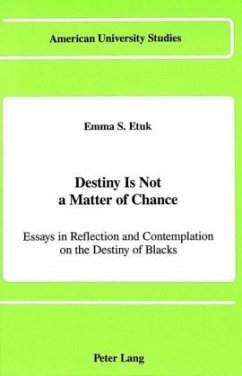In the introduction to his stirring work, Emma Etuk relates, "The origines of these essays go back to my years at the seminary, to the many lonely nights spent in my sixth floor efficiency room, to many moments when I stayed up sleepless, wondering about my destiny, the destiny of my people--Africans and Africans in the Diaspora--and the relevance of God in the historical evolution of my people...I frequently asked myself, in those quiet moments and stillness of the night, "What is the destiny of the Africans and of Africans of the Diaspora on this planet? Why did God create us Africans? Why is he here on earth at this time in history? What is his role in the systems of this universe?" From such quiet moments of reflection comes Destiny Is Not a Matter of Chance, a powerful work that interweaves the writings of African-American leaders such as Douglass, Washington, and Dubois, with the work of contemporary African thinkers such as Nkrumah, Senghor, and Azikiwe, to produce an original treatise on the nature of black destiny.
"A very incisive and indepth approach to the fundamental and ever pending question on the destiny of man generally and that of the Africans...Etuk not only delineates the problem but proposes solutions..." (Chester W. Gregory, Coppin State College)
"...provocative and excruciating investigation...speaks boldly and clearly. The ideas in this book should effectively remove the excuse of indirection among black leaders." (Jay Richards, Clinical Psychologist)
"His perspective style logically argues and challenges with a directness which...I find exhilarating. The historical context of the study based on a global approach to liberation struggle...is in line with the historiographical shift." (Esme Bhan, Research Associate, Moorland-Spingarn Research Center, Howard University)
"This study captures the imagination from the very beginning..." (Doris Hull, Africana Bibliographer, Howard University)
"...provocative and excruciating investigation...speaks boldly and clearly. The ideas in this book should effectively remove the excuse of indirection among black leaders." (Jay Richards, Clinical Psychologist)
"His perspective style logically argues and challenges with a directness which...I find exhilarating. The historical context of the study based on a global approach to liberation struggle...is in line with the historiographical shift." (Esme Bhan, Research Associate, Moorland-Spingarn Research Center, Howard University)
"This study captures the imagination from the very beginning..." (Doris Hull, Africana Bibliographer, Howard University)

